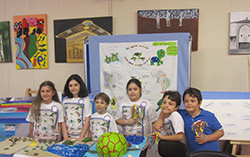
SEMEP PROJECT
- THE DEPARTMENT CONDUCTING THE PROJECT: Physical Sciences Department
- PROJECT DURATION: 1 YEAR
- STUDENT AGE GROUP: Elementary and secondary school students
- PURPOSE OF THE PROJECT: SEMEP Project adopts the principle of learning by experience, an approach based on the discovery of knowledge by the use of eefctive education techniques instead of its immediate transfer from the teacher to the student. Basic goals of SEMEP are as follows: to foster creativity in our students, to improve their environmental consciousness both regionally and globbaly, strengthen their skill of problem-solving and establish the consciousness of “environment for life, life for environment.” The yearly theme specified by UNESCO is reported to the coordinators. The schools carry out their works throughout the year and these studies are evaluated at the end of the year.
- OBJECTIVE OF THE PROJECT: To establish an environmental-friendly approach by raising conscious, researching and responsible individuals.
- IMPLEMENTATION PHASES OF THE PROJECT: Every year a specific theme is identified by UNESCO. The theme is announced to national coordinators. Then the coordinators inform the regional coordinators about the theme. Regional coordinators carry out studies in coordination with regional schools in line with the specified theme, and evaluations are done throughout the year. International communication continues steadily within the year.
- PROJECT PRODUCTS: Contest preparation. Photoblock. School board works. Student presentations. Surveys.
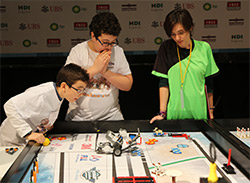
FIRST LEGO LEAGUE PROJESİ
- THE DEPARTMENT CONDUCTING THE PROJECT: Physical Sciences Department
- PROJECT DURATION: 1 YEAR
- STUDENT AGE GROUP: 5th, 6 th, 7 th and 8th grade students
- PURPOSE OF THE PROJECT: To arouse our students’ interest in science and technology, and to have them acquire meaningful life skills.
- OBJECTIVE OF THE PROJECT: The teams make original scientific research on a socially significant theme and prepare robotic designs by using LEGO products every year. Following these preparations they attend the tournament. Our students attending the tournament not only focus on the solution of a certain social problem but also fulfill a mission by using the robot they have designed. Our primary objectives are to raise our students’ awareness of their social responsibilities, to estanlish team spirit and to arouse their interest in science.
- IMPLEMENTATION PHASES OF THE PROJECT: Necessary materails are prepared by using toy blocks. And the robotsa re programmed for each mission. Drama performances on the specified social theme are prepared.
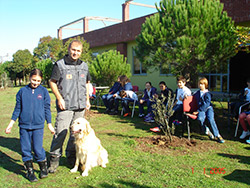
K-9 EDUCATION CLUB
- THE DEPARTMENT CONDUCTING THE PROJECT: Physical Sciences Department
- PROJECT DURATION: 1 YEAR
- STUDENT AGE GROUP: 4th, 5th and 6th grade students
- PURPOSE OF THE PROJECT: To have the students acquire the experience of dog training by improving the students’ skills of leadership and to raise their awareness of love of animals and nature.
- OBJECTIVE OF THE PROJECT: To incline the students who want to have a dog to correct behaviour by informing them about the matter. To establish the culture of living with dogs by have the students who are afraid of dogs and other animals receive the relevant education from speacilists and gain awareness about the balance of nature in terms of animals.
- IMPLEMENTATION PHASES OF THE PROJECT: Students are informed about dogs and dog care. Studies are carried out in order to infuse the children with love of dogs. Köpek sevgisini aşılamak için çalışmalar yapılır. They make activities with dogs in nature.
- PROJECT PRODUCTS: Robot Design. School Board works. Drama workshops.
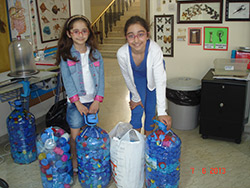
ÇEP PROJECT- ENVIRONMENTAL EDUCATION AND APPLICATION
- THE DEPARTMENT CONDUCTING THE PROJECT: Physical Sciences Department
- PROJECT DURATION: 1 YEAR
- STUDENT AGE GROUP: Elementary and secondary school students
- PURPOSE OF THE PROJECT: To raise environmental consciousness in all students, to raise them as more environmentally sensitive individuals and therefore, to contribute to the upbringing of an interrogating young generation who take part in the prevention of environmental pollution both in their school and their vicinity, who thinks of possible solutions of all kinds of environmental problems and who take active part in the struggles for the recovery of natural environment. The purpose of the Environmental Education and Application in Schools Project is to raise an environmentally-conscious individuals and to make them part of the solution from now by assigning them responsibilities about the protection and betterment of the environment in line with the approach of sustainable development.
- OBJECTIVE OF THE PROJECT: The basic objectives of the ÇEP Project are as follows: To equip the students with the necessary knowledge, value judgments, attitudes, responsibilities and skills for the protection and betterment of the environment, and thereby to foster new ways of behaviour both at individual and the social level. Another objective of the project is to raise our students as consicous consumers.
- IMPLEMENTATION PHASES OF THE PROJECT: Environmental Education and Application in Schools Project is carried out in three branches: Environment Trainings, Environmental Examinations and Environmental Actions. Within the scope of the Project, at least two eco volunteer teachers from each school and five eco volunteer students from each class are assigned and trained. Eco volunteer students are identified by the volunteer student ID cards given to them. Volunteer students are responsible for the environmental organization and monitoring in the vicinity of their own schools. Eco volunteer students can organize activities and demonstrations providing that they do not violate legal boundaries. Forest and Youth Camps aim at informing the attendant students about forests and life in nature. The attendants endeavor to protect the forest from fires and every kind of degeneration with the support and participation of conscious people around. Other primary topics for the students are the protection of historical, touristic, cultural and natural assets, and the struggle for the betterment of the natural environment.
- PROJECT PRODUCTS: Collecting bottle caps. Waste oil collection. School board works. Week of environment activities.
LITTLE TEMA PROJECT
- THE DEPARTMENT CONDUCTING THE PROJECT: Physical Sciences Department
- PROJECT DURATION: 1 YEAR
- STUDENT AGE GROUP: 1st, 2nd, 3rd. And 4th grade students
- PURPOSE OF THE PROJECT: To provide that our students gain environmental consciousness at early ages, be informed about environmental problems, to develop positive attitudes and to gain skills about environmental matters and take part in the solution of them.
- OBJECTIVE OF THE PROJECT: Childhood is a period when the human development is quite rapid. For this reason, the children’s experiences in this period are influential in conditioning their lifelong approaches, value judgments, behaviours, habits and identities. The activities to be conducted in the childhood stage of their lives render an effective method for them to acquire love of nature as well as proper attitudes and behaviours oriented at sustainability.
Little TEMA, which considers this stage of the child’s life as an opportunity for improvement, has been implemented since 2010 with the support of the Ministry of National Education and is the most extensive environmental education programme for children in Turkey. The programme including 42 activities and memory games as well as various materials such as oak and soil posters, children’s books, observation boxes, etc. is implemented between September and June every year.
- IMPLEMENTATION PHASES OF THE PROJECT: Before the training starts, all chapters of the “Litlle TEMA Education Programme” is read and its content is analysed. The activities are selected according to the grade levels and developmental characteristics of the children. 26 activities in total are selected for the programme to achieve its objective. And an implementation Schedule is planned out of the selected activities.
An environment fit for the principles of active learning is provided for the education and training process to begin. Activities are conducted according to the implementation schedule. Within the Little TEMA Education Programme, supportive activities dealing with the same acquirements are included at various times in order to render permanent the acquisitions supposed to be accessed by children.Each child fills her/his individual evaluation form two times, one before the commencement of the programme and the other, after the completion of the programme in order to evaluate the efficiency of the programme and to monitor the developmental effects in children. At the end of each activity, post-exercise reports are also filled.
- PROJECT PRODUCTS: School board works
BABY TEMA PROJECT
- THE DEPARTMENT CONDUCTING THE PROJECT: Physical Sciences Department
- PROJECT DURATION: 1 YEAR
- STUDENT AGE GROUP: 5th, 6 th, 7 th and 8th grade students
- PURPOSE OF THE PROJECT: The project contributes to our purpose of raising our students as ecologically literate individuals adopting sustainability as a life principle, understanding the importance of soil for life, considers erosion as the most critical threat to soil, struggling with erosion, protecting natural assets and sensitive to the natural environment.
- OBJECTIVE OF THE PROJECT: Baby TEMA activities contribute to the students’ acquisition of the skills of responsibility, leadership, solutions producing, researching, public speaking, expressing oneself as well as imbue them with the consicousness of volunteriness and sensitivity to social and environmental problems.
- IMPLEMENTATION PHASES OF THE PROJECT: Baby TEMA begins with a presentation of the project after meeting with the demandant secondary schools. The activities of the Project are as follows: erosion and environment training for schools, collecting and growing acorn seeds, sapling planting, national and international organizations and erosion training camp. In addition to these, documentary films screening, voluntary works, works about waste management, environmental cleaning and contests of painting, composition and poetry are carried out within the scope of the project.
- PROJECT PRODUCTS: School board works.
ECO-SCHOOLS PROJECT
- THE DEPARTMENT CONDUCTING THE PROJECT: Physical Sciences Department
- PROJECT DURATION: 1 YEAR
- STUDENT AGE GROUP: 5th, 6 th, 7 th and 8th grade students
- PURPOSE OF THE PROJECT: Eko-schools is a programme aiming at having the elementary and secondary school students acquire environmental consciousness and skills of environmental management as well as giving them training on sustainable development. Marmara Private Secondary School which has been implementing the project since 1999 won its first flag in 2001. The gren flag which is a world-renowned eco-label is renewed biennially.
- OBJECTIVE OF THE PROJECT: The objective of the environmental education given by our school is to raise environmentally conscious individuals who are aware of environmental problems and who produce solutions be be put into practice. Eco-schools Project is an international eco-label that provides students’ acquitisiton of environmental consciousness with implementations including 7 steps that are to be practiced by students with various points of view.
- IMPLEMENTATION PHASES OF THE PROJECT: Enrollment. Implementation of the programme. Application for the award. Award renewal.
- PROJECT PRODUCTS: School board works. Gren flag.
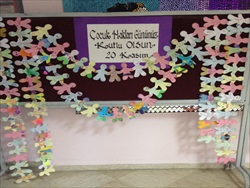
I’M GROWING UP WITH MY RIGHTS
- THE DEPARTMENT CONDUCTING THE PROJECT: Department of Psychological Counselling and Guidance
- PROJECT DURATION: 1 YEAR
- EXTENT OF THE PROJECT: Intraschool
- PURPOSE OF THE PROJECT: To infor the students about their civil rights, to provide they consciously claim their rights, to extend the consciousness of rights and liabilities specified in the contract and to sensitize the adults and provide their support on the practicing of children’s rights.
- •OBJECTIVE OF THE PROJECT: To raise the students’ awareness of their rights and liabilities, and to provide that they can proclaim these to the adults around them.
- IMPLEMENTATION PHASES OF THE PROJECT: The preparation of the written and visual materials (brochures, etc.) to be used in the the guidance and counselling activities that are to be conducted in the classroom and at school level. The preparation of the label pins that the students will carry on in the Children’s Rights Day. The assignment of class representatives for the collection of the necessary materials that are to be used for the school boards. The organization of the wood panel to be exhibited in the school environment for the Children’s Rights Day with the written and visual materials emphasizing the significance of the day. Conference on children’s rights and liabilities after the 7-minute screening of the topical cartoon film. Discussion about the children’s rights brochure and attendance of the students to the school acitivity with their label pins on. Offering of child-shaped cookies to the children in breakfast hour.
- PROJECT PRODUCTS: Children’s Rights Tree. Children’s Rights board. Visual (short-length animation films) and written (convention of the rights of children brochure) materials. Lapel pins designed specifically for the children’s rights day.
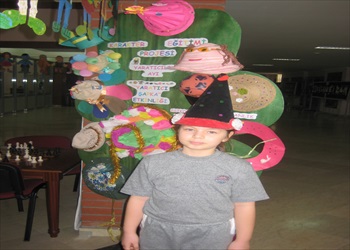
CHARACTER – VALUES EDUCATION PROJECT
- THE DEPARTMENT CONDUCTING THE PROJECT: Department of Psychological Counselling and Guidance
- PROJECT DURATION: 1 YEAR
- EXTENT OF THE PROJECT: Intraschool
- PURPOSE OF THE PROJECT: The Project implemented at the level of elementary and secondary schools aims at acquiring our students basic values beneficial for the society.
- OBJECTIVE OF THE PROJECT: To raise character-wise individuals. To provide that the students are able to actualize their skills by transforming them into knowledge. To consolidate basic values. To infuse the concept of cultural pluralism and other universal values into the students. To provide that the students know themselves and recognize their abilities. To provide that they raise as responsible individuals who use their communication skills properly. To provide that the students achieve what is good and correct in life through character education.
- IMPLEMENTATION PHASES OF THE PROJECT: Designation of the activities by interdisciplinary cooperation in parallel with the subjects of values education coming from the Ministry of National Education at the beginning of the academic year. Delivery of the explanatory bulletin on the values to be taught to parents. Preparation of the home activities to be implemented by parents for the internalization of the values taught at the school and their delivey to parents. Transformation of some home activities into school activities. Preparation of related classroom activities of each grade level in counselling and guidance hours. Distribution of the topical “Character Education-Values Project Form” among students before the beginning of each activity. The completion of the activity with the second post-activity evaluation. Exhibition of the materials about the classroom, school and home activities in the classrooms, school boards, school corridors and the foyer area.
- PROJECT PRODUCTS: Bulletins for parents. House activities. School activities. Classroom activities. Visual works. Written works. 3D works.
- EVALUATION: At the end of each study the students are asked to fill an information form on what they learned about the topic. The teachers implementing the activities are also asked to fill forms on whether the activity achieved its objectives. The students’ behaviorial changes are monitored in line with the observation of the teachers.
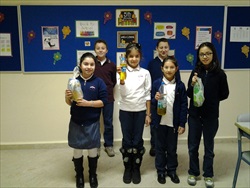
PROTECTING IS EASIER THAN CLEANING
- THE DEPARTMENT CONDUCTING THE PROJECT: Department of Psychological Counselling and Guidance
- PROJECT DURATION: 1 YEAR
- EXTENT OF THE PROJECT: Intraschool
- PURPOSE OF THE PROJECT: To raise our students’ awareness of “Cleanliness” both towards themselves and their environment, and to provide that they internalize responsible behaviours towards the world they live in. To raise the students’ awareness of the pollutive effects of waste oil on water and to provide that they collect and bring the used oil at their home to the school every week.
- OBJECTIVE OF THE PROJECT: To contribute to environmental cleaning, to raise a common awareness of responsibility toward nature both in students and their families, to contribute to the students’ internalization of proper attitudes by grasping the importance of water for life.
- IMPLEMENTATION PHASES OF THE PROJECT: Starting a waste oil campaign in parallel with the project “Protecting is Easier than Cleaning” with a bulletin sent to parents. Collaboration with secondary school level ÇEP students. Collaboration with the Directorate of Environmental Protection affiliated with the District Municipality within the scope of “Clean Environment, Life without Hindrance”. Getting into contact with the associations of TURMEPA and DENİZ TEMİZ. Collection of waste oils coming from houses to the school in the waste oil cans throughout the year. The screening of the documentary “Temiz Eller” in the classrooms. Collection of the waste oil in the refectory by bioenergy companies. Exhibition of the topical materials brought by students on the school boards.
- PROJECT PRODUCTS: Photographies. Waste oil collection. School board works.
- EVALUATION: Weighing of the collected waste oil by the officers from the partner municiplaity and the delivery of the wheelchairs won in return of a certain amount of waste oil to the needers.
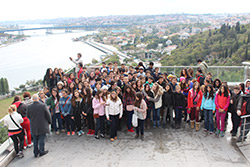
ISTANBUL KENT PROJECT
- THE DEPARTMENT CONDUCTING THE PROJECT: Social Sciences Department
- PROJECT DURATION: 1 YEAR
- EXTENT OF THE PROJECT: Intraschool
- PURPOSE OF THE PROJECT: Preparation of an extensive city project after the fam trip organized by the department so as to introduce the prominent features of the city we live in to the students.
- OBJECTIVE OF THE PROJECT: To improve the students’ skills of understanding, communication, information literacy, organization and interpretation.
- IMPLEMENTATION PHASES OF THE PROJECT: The İstanbul excursion arranged in January 4 was the first step of the project. The places that would be visited were shared with the students before the excursion. The places visited during the excursion were introduced to the students with their prominent features. In this way, the students had prior knowledge and attended the excursion in a consicous way. These introductions during the excursion were recorded in the form of photographies and videos. After the excursion these records were organized and the photos and the videos were prepared as exhibition materials and introductory videos respectively. For the programme, Istanbul Club prepared Istanbul poems, Music department prepared Istanbul songs, Painting department prepared painting works on Istanbul, Social Sciences department prepared the introductory filmslides and videos, and the general text of the programme was written with the contributions of the Turkish Language department. Furthermore, a folk dance performance was prepared by the folk dance trainer and was staged at the end of the programme. All the organizations and visuals were presented to the secondary school community January 8, 2014 after having been organized by the social sciences department teachers.
- PROJECT PRODUCTS: All the above-mentioned studies were presented to the secondary school students through a conference hall programme conducted in January 8, 2014.